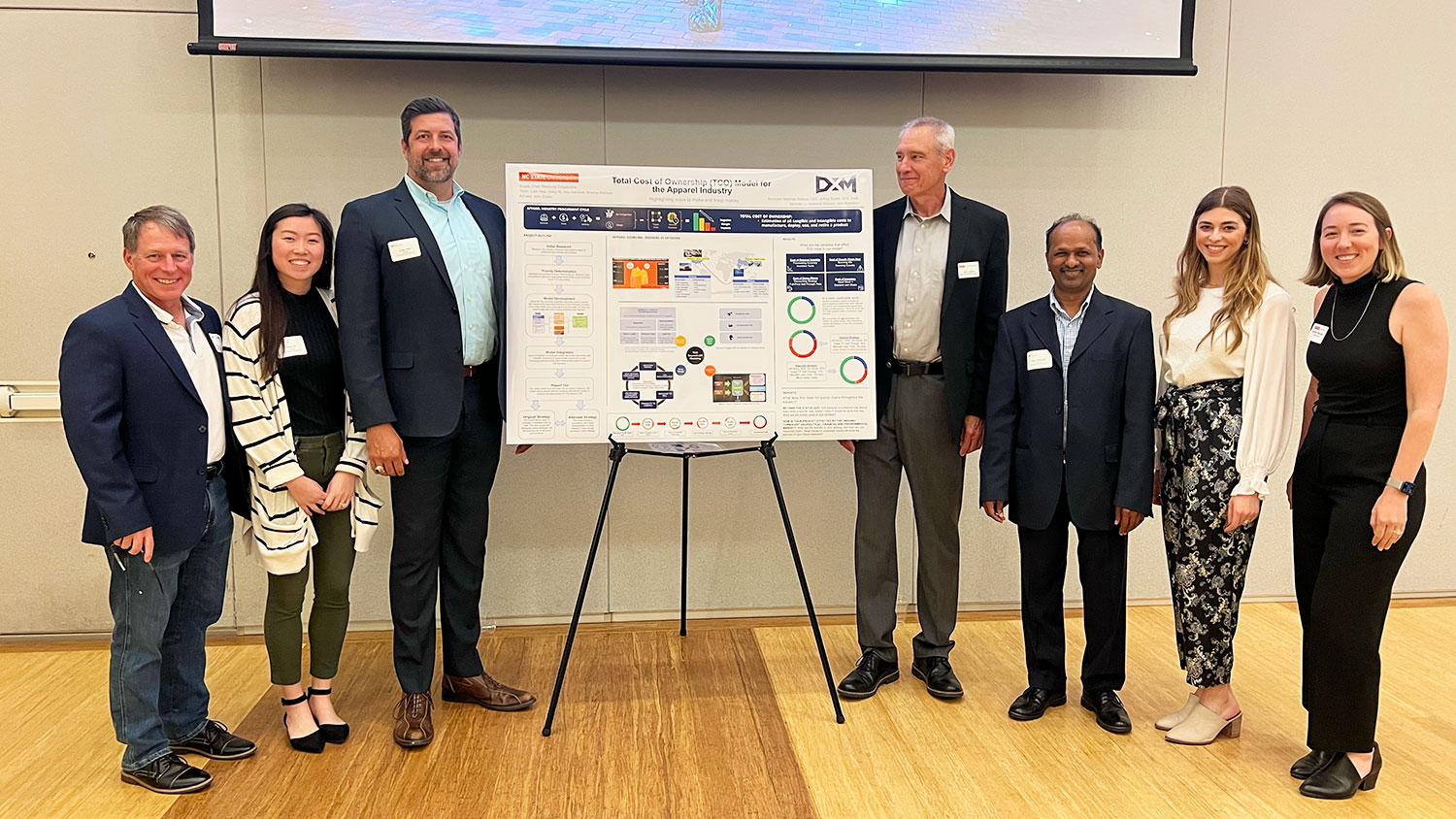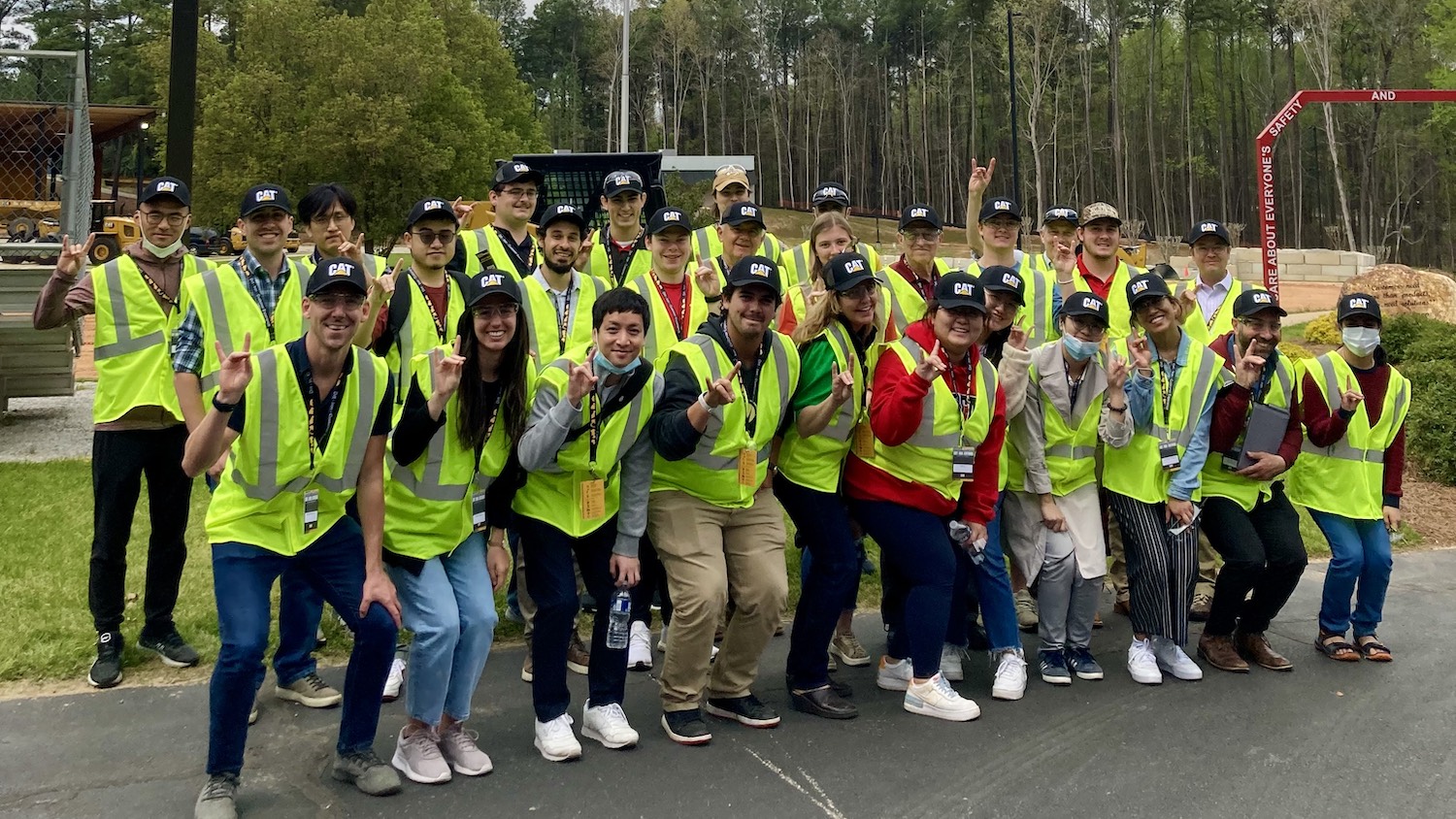SCRC MBA Fellowship Enables Gibson to Strengthen Finance, Operations Skills
Chris Gibson knows his numbers.
A finance and supply chain management student in the NC State Poole College’s Jenkins MBA program – and one of the college’s Supply Chain Resource Cooperative (SCRC) fellows – Gibson has honed quantitative expertise in the classroom and beyond.
Last summer, he had an internship with Caterpillar Logistics; this year, he is working with Duke Energy as part of his SCRC Fellowship.
“Financial and organizational forecasting can be very complex,” Gibson said. “The combination of my internships and my MBA studies is helping me better understand how to approach these processes.”
The supply chain fellowship is one of the value points that attracted him to NC State and the Jenkins MBA program, he said.
“During my undergraduate studies, I had very little time for electives between my civil engineering and architectural classes. When I entered the construction management field, I learned quickly of the importance of an understanding in financial assessment and people management,” he said.
Learning the Language of Business
“I realized that to be an effective manager, I needed a better understanding of the languages and processes used by marketers, investors, and operations managers. Even if I do not act in all of these roles, I at least needed a good understanding of how they think and act,” Gibson said.
He decided to wait on graduate school until he “built up enough experience that I could relate any topic we were learning to how I could have applied the topic to my previous job,” he said.
When he started looking after five years of work, he said that he found “NC State had a unique combination of an affordable full-time program in an area with lots of job opportunities – Research Triangle Park – and specialties in supply chain management and finance topics that appealed to my engineering background. While many MBA schools offer classes in finance, marketing and operations, I was also drawn to the strength of the Supply Chain Resource Cooperative,” he said. “I saw that the highly rated faculty and strong corporate ties would be very beneficial in setting me up for success in operations in my career.”
Caterpillar, Duke Projects Strengthen Analytics, Operations Skills while Expanding his Network
Now a second-year MBA student, Gibson has already benefited from the SCRC’s corporate network. While at Caterpillar, he worked on a variety of projects that included use of analytic tools to forecast the amount of space needed for new construction projects and to predict construction and land costs. Gibson also gained exposure to six sigma, a statistically driven business strategy that he says is widely used by the company.
“CAT Logistics is a very analytical company,” Gibson said. “They embrace six sigma processes by making all their tools have an analytical background, and by encouraging the use of these tools to make sure analytical reasoning is the common ground between employees.”
Gibson also notes that Caterpillar’s structured training activities, geared towards teambuilding amongst its interns, helped foster communication and collaboration. New interns navigate a ropes course and are taken on tours of other company divisions. This allows them to see the various company roles, and to appreciate the importance of all employees, he said.
“Putting the interns on a high ropes course got us to communicate and trust each other. It was a good lesson on how effective and respectful communication can be, even in high stress situations, if you trust your coworkers,” he said.
Building on Engineering Background
“There were many MBA programs with strong finance concentrations, so I based my search on which programs fit me better on the whole. I have always been interested in operations, and NC State has a strong supply chain management program,” Gibson said when asked how he chose the NC State Jenkins MBA program.
“Ultimately, I knew I could benefit from what NC State’s program could teach me about how to quantify decisions,” he said.
A Licensed Professional Engineer with five years’ experience in commercial construction management in Washington, D.C., Gibson said he appreciates the opportunities the Jenkins MBA program has provided to look at business operations from different perspectives.
“I pursued an internship with Caterpillar last summer because I wanted exposure to manufacturing industries,” he said. “I have interacted with many manufacturers in my previous work, but have not had much opportunity to learn the operating principles by which they work. I have learned in construction management that the relationship with your supplier can work a lot better if you understand their motivations and how they work, and I wanted to use the summer to learn more about manufacturing.”
The experience complements his previous career path, which included executing and building design requirements. “Construction management has been moving into a more tightly integrated creation process between the owner, designer, and builder in the last few years, but I have not yet had a chance to be in the role of owner driving the overall goals of the project,” he said. In his internship, he gained a better understanding of planning processes required for making forecasting decisions.
During the Duke Energy Fellowship that he started last fall, Gibson is learning how a public facing company operates, he said. “Although this is in a different department and role from the one I worked with at Caterpillar or my previous job, the underlying principles of supplier relationships and process improvements are a common thread throughout construction, manufacturing, and the utility business and I hope the experiences I am gaining at CAT Logistics will help strengthen my skills in those categories.
Helping Interns Acclimate to Corporate Setting
Gibson also gave a more personal reflection on on his summer internship experience at Caterpillar.
“One of my biggest worries before starting the internship was how I would acclimate to a company that is substantial bigger than my previous employer or even any university I have attended,” he said. He found that, “even with over 100,000 employees, many of the employees seem to enjoy their roles and remain with the company for many years,” he said, a testament to the company’s commitment to valuing its employees.
“It shows in the attitude of my coworkers,” he said. That includes helping its cadre of interns acclimate through team building activities that include visiting the company’s various divisions and participating in a ropes course.
“It turns out, putting all the interns out on a high ropes course is enough of a stressful situation to get us to communicate and trust each other. It was a fun day, but also a good lesson on how easy effective and respectful communication can be, even in high stress situations, if you just have confidence to trust coworkers,” Gibson said. He also has a made a point of meeting other interns for lunch, to learn about their various roles in other parts of the company.
“During my undergraduate studies, I had very little time for electives between my civil engineering and architectural classes. When I entered the construction management field, I learned quickly of the importance of an understanding of financial assessment and people management. I realized that to be an effective manager (when I reach that point) I needed a better understand of the languages and processes used by marketers, investors, and operations managers. Even if I do not act in all of these roles, I at least needed a good understanding of how they think and act,” he said.
“I told myself I would wait to attend graduate school until I have built up enough experience that I could relate any topic we were learning to how I could have applied the topic to my previous job. When I started looking after five years of work, NC State had a unique combination of an affordable full-time program in an area with lots of job opportunities – in the Research Triangle Park – and specialties in supply chain management and finance topics that appealed to my engineering background,” Gibson said.
“While many MBA schools offer classes in topics of finance, marketing and operations, I was also drawn to the strength of the Supply Chain Resource Council. I saw that the highly rated faculty and strong corporate ties would be very beneficial in setting me up for success in operations in my career,” he said.
- Categories:


